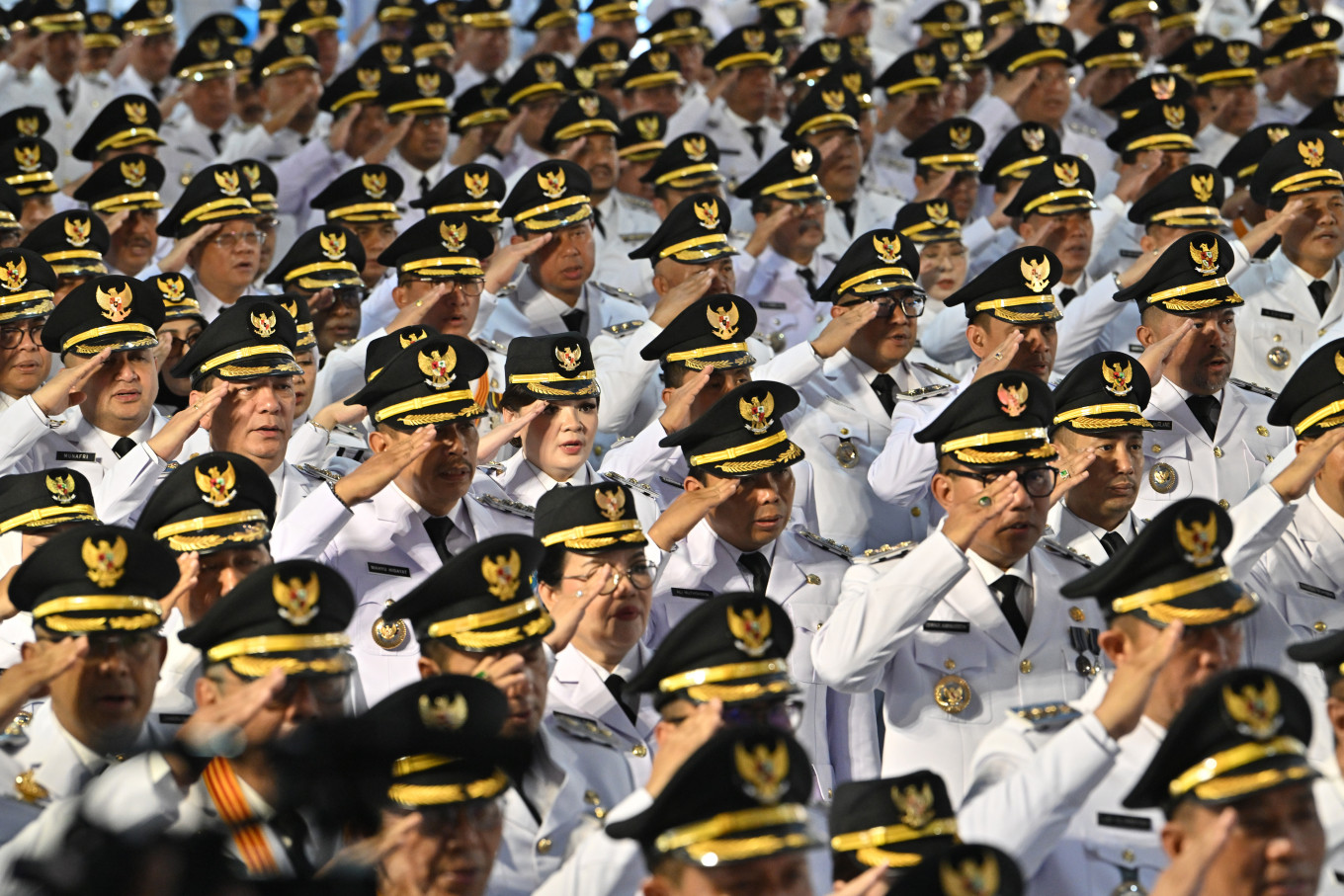Popular Reads
Top Results
Can't find what you're looking for?
View all search resultsPopular Reads
Top Results
Can't find what you're looking for?
View all search resultsDiversity within unity
The regional governments, and their elected leaders, represent this diversity, and they are the only political institution to do so.
Change text size
Gift Premium Articles
to Anyone
 Elected regional heads attend the inauguration ceremony at the Presidential Palace complex in Jakarta on Feb. 20, 2025. President Prabowo Subianto inaugurated 961 regional heads consisting of 33 governors and 33 deputy governors, 363 regents, 362 deputy regents, 85 mayors and 85 deputy mayors in the ceremony. (Antara Foto/Aditya Pradana Putra)
Elected regional heads attend the inauguration ceremony at the Presidential Palace complex in Jakarta on Feb. 20, 2025. President Prabowo Subianto inaugurated 961 regional heads consisting of 33 governors and 33 deputy governors, 363 regents, 362 deputy regents, 85 mayors and 85 deputy mayors in the ceremony. (Antara Foto/Aditya Pradana Putra)
A
s we try to live up to the state motto Bhinneka Tunggal Ika (Unity in Diversity), given today’s political landscape in Indonesia, we may want to emphasize diversity rather than unity. We may even want to rephrase it to “diversity within unity”. The difference is more than semantics.
One of the characteristics of Indonesia’s diversity is the autonomy that regional governments supposedly have. But we are seeing signals that this is not being respected amid increasing signs of Jakarta recentralizing the government by reimposing greater control over the regions.
Following Thursday’s inauguration of 961 regional heads (governors, regents and mayors) and their deputies by President Prabowo Subianto in Jakarta, we want to remind these new leaders of the sweeping powers that they have under the 2004 Regional Autonomy Law.
It is incomprehensible why these officials, directly elected by the people in their regions in November, should be subjected to time-consuming dress rehearsals for their inaugurations in the Presidential Palace. They are guests of honor on the day. And after their inaugurations, they were all sent packing to the Military Academy in Magelang, Central Java, for an eight-day retreat.
It may have been within President Prabowo’s prerogative to send members of his Cabinet to the military bootcamp last October, (that was for three days, shorter than the regional heads are doing). But sending officials who were directly elected by the people sends the wrong message about the balance of power between central and local governments. The fact that none of them has refused to go also tells us much about the quality and independence of these officials.
There is nothing wrong in subjecting them to military fitness exercises to instill discipline and to forge unity in purpose before these officials begin their work. But this retreat sounds more like an attempt at imposing uniformity over regions whose diversity we all recognize.
This latest development reinforces our concerns about Indonesia backsliding on its commitment to democracy, a trend which, if it continues, could plunge Indonesia back into authoritarianism.
We are already seeing the trend of increasing militarism, with the appointment of active military officers to strategic government jobs, reminiscent of the old military dual function. Prabowo has also announced a plan to set up 100 new Army battalions to implement his signature policy of giving free nutritious meals to schoolchildren, pregnant women and toddlers, nationwide.
Compromising regional autonomy would be another major blow to an already weakening democracy. And it could undermine the concept of diversity itself.
President Prabowo has already co-opted most other centers of political power in the country. His big tent coalition government includes all but one of the political parties represented in the House of Representatives. The lone opposition, the Indonesian Democratic Party of Struggle, is too weak to contain the coalition’s might, which also counts on the support of special interest groups such as business, Islam, the military and the police. Now he has trained his eye on the regional heads.
Prabowo in a major speech previously expressed disdain at the regional autonomy arrangement, by proposing to do away with the direct election mechanism for regional heads. Direct elections were introduced in 2005 as part and parcel of the Regional Autonomy Law. Reverting to indirect elections, presumably giving that authority to local legislators, would take that power away from the people’s hands.
We Indonesians pride ourselves on our diversity, which we all see as the source of our strength. This is a country of 280 million people, the fourth largest in the world, with a very diverse population in terms of race, ethnicity, tradition, culture, religion and languages.
The regional governments, and their elected leaders, represent this diversity, and they are the only political institutions to do so since political parties, by law, must be headquartered in Jakarta.
When these regional heads finish their retreat and begin their jobs next week, they must remember that their allegiance, first and foremost, is to the people who voted them in, and not to the rulers in Jakarta.










